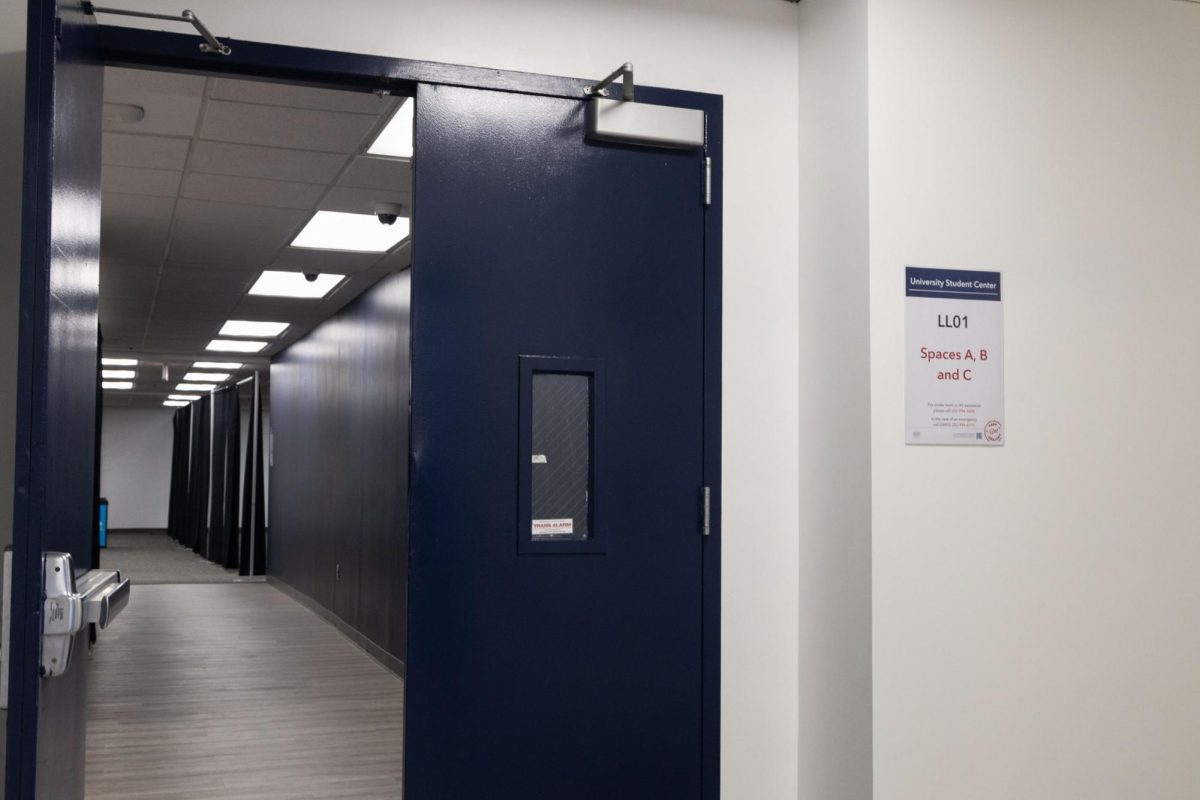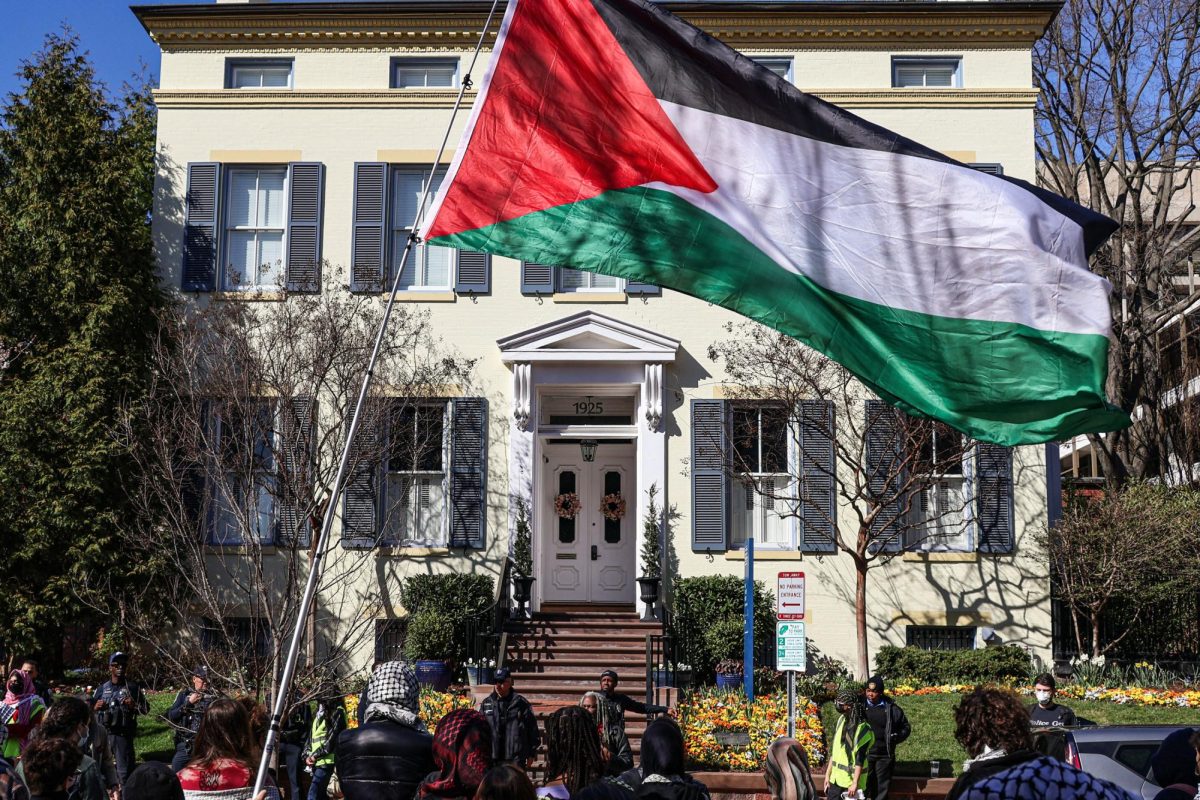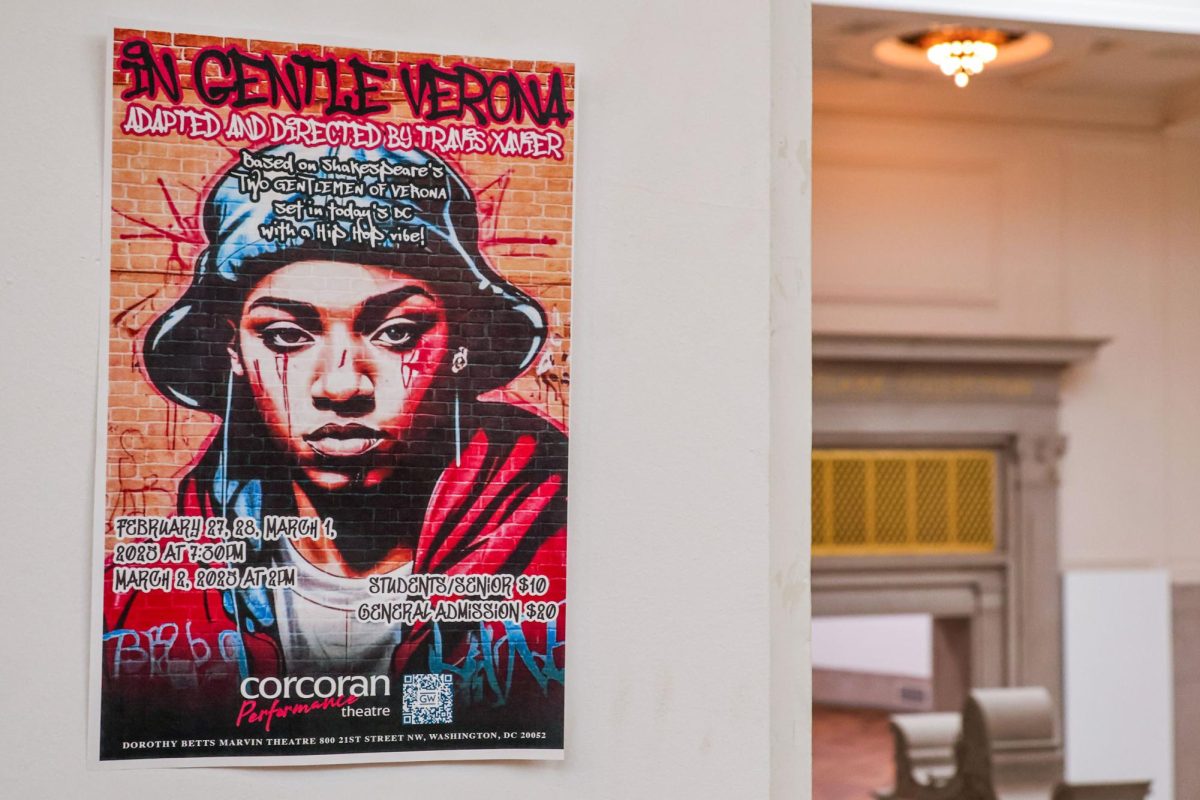Officials announced new spaces in the University Student Center available to student organizations who require rehearsal spaces in an email to registered student groups earlier this month.
The new spaces — located where the previous campus bookstore was on the lower level of the student center — consist of three rooms divided by black curtains, each with one built-in speaker, and opened on Oct. 14. Leaders of performance-based organizations said that the new spaces and waived fees show that the University is considering their complaints of limited availability and rising rental fees for spaces but added that the thin curtains between the spaces allow sound to spill into each room, making the spaces “impractical.”
Student organizations expressed difficulties when booking spaces for programming last fall due to low availability and high rental costs for venues like the Lisner Auditorium and the City View and State rooms in the Elliott School of International Affairs.
Officials announced in an email to student leaders Tuesday that standard fees for housekeeping, venue rental and the presence of GW Police Department officers for venues like the Lisner and Jack Morton auditoriums and the City View and State rooms will be waived for student organizations after working with the Student Government Association to assess the financial needs of student groups on campus.
The estimated cost for a “singing performance” in Lisner is $8,201.89 after the fees for GWPD presence, housekeeping and rental fees are removed, according to an example estimate provided by GW Events & Venues. The remaining fees cover production costs for equipment like microphones, a sound system and “labor crew,” according to the estimate.
For a “University Event” on a weekday after 4 p.m. and a day of the weekend in Jack Morton Auditorium, the estimated cost based on a standard five-hour slotted event is $1,658.75 and $2,189.55, respectively, and the price is $175 for a weekday and weekend day event in State Room.
Media Relations Specialist Shannon Mitchell said the University regularly evaluates and adjusts available spaces for student organizations and is “proud” to offer a variety of venue spaces for a range of events. Mitchell said student organizations are not charged the standard rental fees for spaces in the student center and that fees associated with the use of temporary staff and equipment may be factored into pricing.
Mitchell said an additional event space used by the Center for Interfaith and Spiritual Life on the lower level of the student center can be booked in coordination with their team.
“The Center for Interfaith and Spiritual Life looks forward to building community with student organizations by collaborating with them to host events in this space,” Mitchell said in an email.
Mitchell said the Events & Venues team manages specialty venues like Lisner and Jack Morton auditoriums and City View and State rooms. She added that the rental, housekeeping and GWPD fees are waived for “internal groups,” but additional fees may still be required like for technical needs, staffing, excessive cleaning, setup or breakdown.
“The Division for Student Affairs and Student center team are committed to continued support for all student organizations, and will continue to prioritize accommodating requests needed for our available spaces,” Mitchell said in an email.
Other free spaces student organizations can book include the Dance Studio on the fifth floor of the student center, District Dance Studio, the Grand Ballroom, the Continental Ballroom, Mitchell Dance Studio, and the Chapel and Black Box on the Vern, which student leaders said in November 2023 are difficult to book due to increased demand for the spaces.
Senior Jeremy Kohler, a Hatchet reporter and member of Generic Theatre Company, said the group has been rehearsing their musical, Cabaret, in the new student center space, which is helpful because the group’s performance will be there and they can “map out” their show. He said the new space is “conducive” to Cabaret because of its location in the basement of the student center and the show takes place in a “seedy underground” nightclub.
“Since it is so bare bones right now, we can kind of turn it into whatever we want to turn it into,” Kohler said.
Kohler said Generic has been able to book the spaces to themselves so far without intruding on other rehearsals. He added that student organizations can book the space three times a week, which he said is “bothersome” because of the lack of availability of other places Generic can book for their rehearsals.
“If we’re set in how many times we can use it, are there other spaces you can provide for us? Like, where else can we go?” Kohler said. “Because there are just some things that require a lot of space, and the University does not have much space.”
Kohler, who is also the president of the GW A Cappella Council, said he was happy when GW announced that the fees for spaces like Lisner Auditorium and City View in Elliott were lifted because he tried to book Lisner for “Battle of the Acapellas” last semester but wasn’t able to due to the high rental fees for the auditorium.
“I was really happy when I saw that they were getting rid of the rental fees, because I’m also like, ‘What is my tuition paying for?’” Kohler said. “Why on earth is it $10,000 to book this space for a day that is pretty much unused for 75 percent of the year?”
Senior Maliah Stevens, the executive producer for GW Shakespeare Company, said the new space is a result of the University listening to the group’s hardships booking a room as a performing arts club. Stevens said the new spaces are big, but it can be disruptive when multiple groups are practicing simultaneously because of the thin curtains and can be “unusable” when another group is using a speaker because the music is loud enough for everyone to hear.
“It feels like we’ve gotten our foot in the door because we’ve had conversations with the University to try and get more resources, to try and get these spaces, and it feels like we’re finally being heard and that we’re getting things we’ve been wanting,” Stevens said.
Stevens said GW Shakespeare Company will continue to use other spaces in Phillips Hall and their favored Black Box on the Mount Vernon Campus until the new student center spaces become more “practical.”
Besides Phillips Hall on the Foggy Bottom campus, Stevens said the Company occasionally utilizes the Downstage under the Lisner Auditorium, but it is “not ideal” due to the many stairs, tap access requirement to enter and the lack of a bathroom.
“It’s a nightmare space,” Stevens said. “We love it because we have it.”
Stevens said the group has difficulty booking spaces that resemble where they will perform and fit all of the cast. Stevens said the group also struggles to book spaces because all student groups have to book through the Student Theatre Council, the coalition of student theater organizations on campus, which makes the process more competitive with about four main companies also looking for practice space.
“If you are a performing arts club or organization on this campus, getting taken seriously or getting the resources you need to make your productions happen, it feels like you’re fighting every single step of the way,” Stevens said.
Senior Manasa Sharma — the president of Capital Funk, a DMV-based hip-hop group — said the group tries to book spaces on the Foggy Bottom campus and commuting to the Vern is inconvenient for its members, but the high demand for spaces hinders their abilities to reserve rooms for practices. She said the new rehearsal space is convenient due to the student center’s close proximity to the Metro station and other residence halls.
She said the built-in speakers are beneficial for the space, but she added that providing noise-canceling walls would improve the spaces.
“Spaces for the arts are oftentimes overlooked and underfunded especially for performance and dance groups,” Sharma said.
Malyna Trujillo, the president of GW Folklórico, said she has not yet seen the new spaces, but the group is “hesitant” to use it because she knows they have to be mindful of “sound bleed” between the rooms. She added that the group’s music is typically louder because their shoes have nails on the bottom.
“As we grow our organization and gain new dancers, we are starting to grow out of the space in the 5th-floor dance studio and would be open to using the new spaces if there are mirrors and it is big enough,” Trujillo said in an email.
Brooke Forgette contributed reporting.








